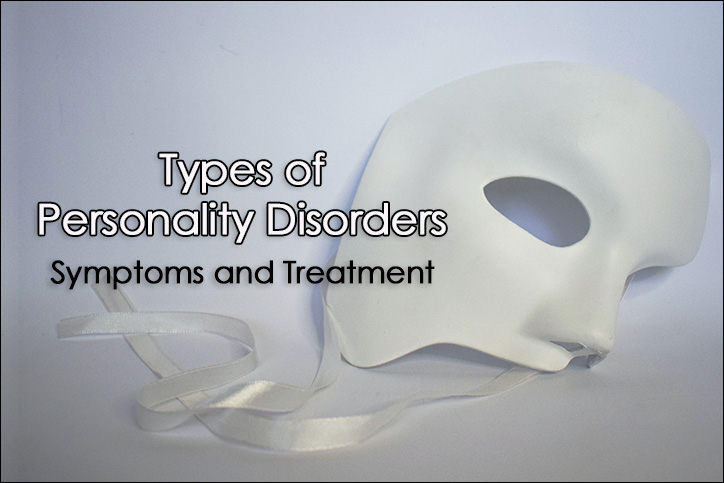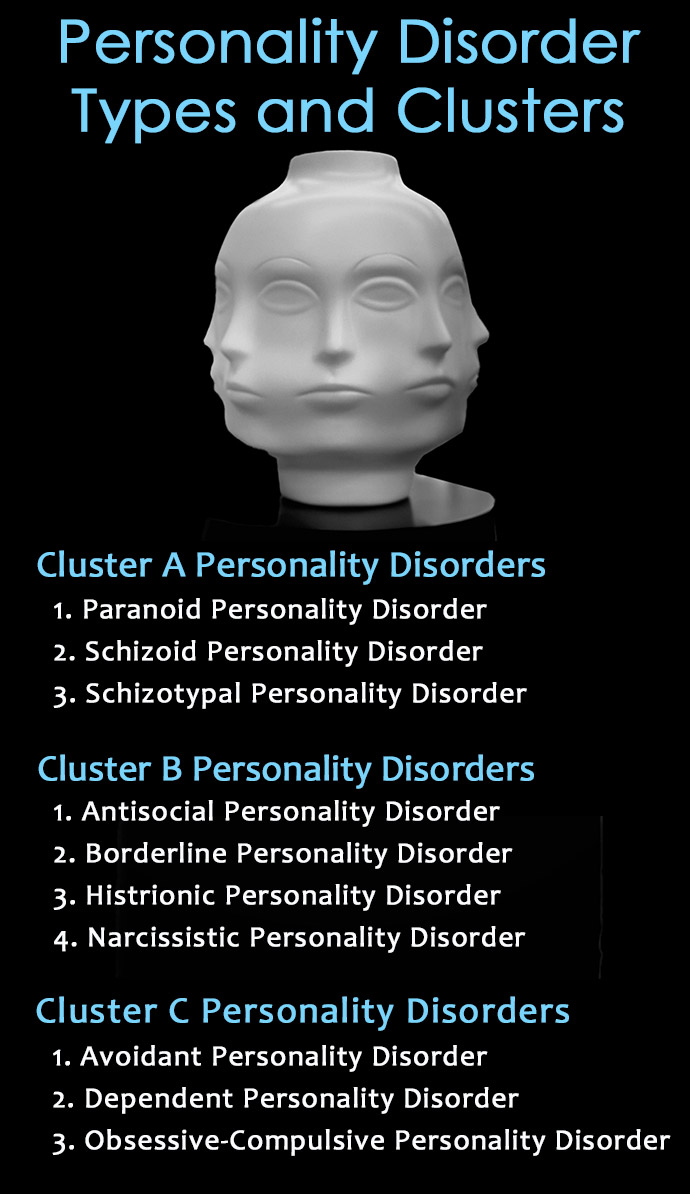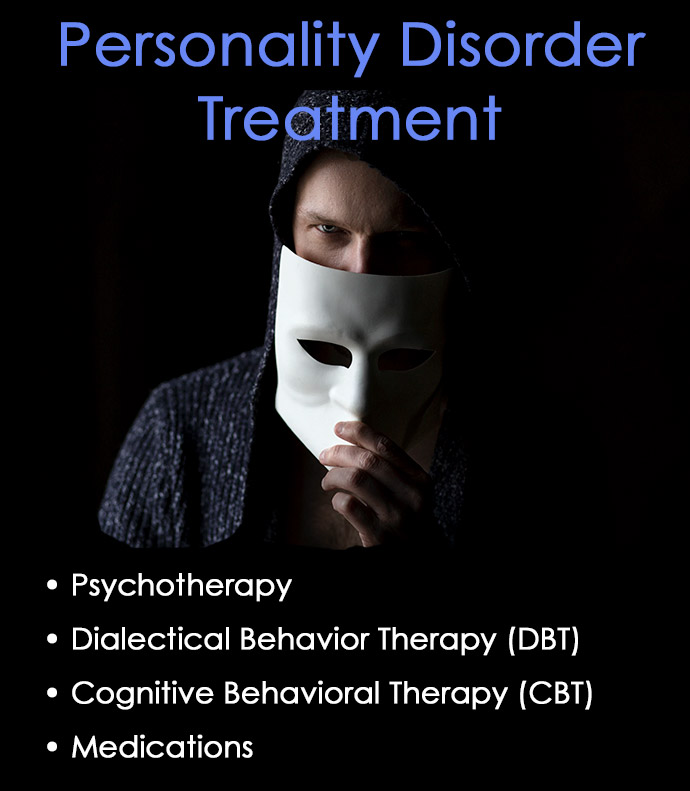Approximately 9% of adults in the United States and 6% of the global population are affected by various types of personality disorders, according to the National Institute of Mental Health (NIMH).
Many personality disorder types usually begin during late adolescence or early adulthood and can cause distress and functional difficulties.
Without proper treatment, some types of personality disorders may persist for a long time.
What is a Personality Disorder?
A personality disorder is an enduring mental health condition that often involves rigid, unhealthy thinking, functioning, and behavioral patterns.
For some people, personality disorders can significantly impact various aspects of life, causing disruptions in work, relationships, and social functioning.
These types of disorders often shape an individual’s personality, self-identity, and interactions with others.
Many times they result in distorted perceptions, abnormal behaviors, and mental or emotional distress.
Personality disorders differ from other conditions like mood disorders such as depression.
A personality disorder affects how an individual perceives or relates to other people, whereas a mood disorder has an impact on a person’s individual emotional state that may cause extreme sadness or happiness.
In general, personality disorders include distorted thinking, as well as difficulties with emotional responses, impulse control, and interpersonal relationships.
Personality Disorder Types and Clusters
The Diagnostic and Statistical Manual of Mental Disorders (DSM-5) categorizes 10 types of personality disorders into 3 clusters:
- Cluster A Personality Disorders (odd/eccentric)
- Cluster B Personality Disorders (dramatic/emotional/impulsive)
- Cluster C Personality Disorders (anxious/fearful)
Identifying a proper diagnosis within each cluster will help determine appropriate treatment options.
Cluster A Personality Disorders
Cluster A Personality Disorders encompass eccentric and peculiar thinking or behavior and consist of the following three disorders:
1. Paranoid Personality Disorder
Portrayed by persistent mistrust and suspicion toward others, even without substantial evidence or justification.
Paranoid Personality Disorder Symptoms Include:
- Pervasive distrust and suspicion of others and their motives
- An unjustified belief that others are trying to harm, deceive, or be disloyal
- Hesitancy to confide in others due to fear of exploitation or betrayal
- Perception of innocent remarks or situations as personal insults or attacks
2. Schizoid Personality Disorder
Involves a consistent detachment from interpersonal relationships, limited emotional expression, and challenges with forming close connections.
Schizoid Personality Disorder Symptoms Include:
- Lack of interest in social or personal relationships, preferring solitude
- Limited emotional expression and difficulty experiencing pleasure in activities
- Inability to pick up on social cues
- Appearing cold or indifferent towards others, and having little interest in sexual relationships
3. Schizotypal Personality Disorder
Characterized by a consistent pattern of intense discomfort and limited desire for close relationships, often hindered by distorted views of reality, superstitions, and unconventional behaviors.
Schizotypal Personality Disorder Symptoms Include:
- Unconventional thinking, behavior, speech, or beliefs, such as believing they can influence people with their thoughts
- Hearing whispers or perceiving hidden messages
- Flat emotions or inappropriate emotional responses
- Social anxiety, discomfort with close relationships, and displaying indifferent or inappropriate responses
Cluster B Personality Disorders
Cluster B Personality Disorders involve dramatic, overly emotional, and unpredictable thinking or behavior, which include the following four disorders:
1. Antisocial Personality Disorder (ASPD)
Illustrated by a consistent lack of respect for others and failure to abide by societal norms and rules.
Antisocial Personality Disorder Symptoms Include:
- Risky behaviors without considering the consequences
- Behaving unpleasantly or aggressively, sometimes involving illegal activities and harming others to fulfill personal desires
- Frequent boredom and acting impulsively
- Lack of empathy, disregard for others’ needs or feelings, and no remorse for harmful behavior
2. Borderline Personality Disorder (BPD)
Described by challenges with emotional regulation, leading to issues such as low self-esteem, mood fluctuations, impulsive behaviors, and difficulties maintaining relationships.
There are differences between borderline personality disorder vs bipolar disorder, and it’s important to understand the distinction.
Borderline Personality Disorder Symptoms Include:
- Impulsive and risky behaviors, including unsafe sex, gambling, and binging
- Fragile self-image
- Unstable relationships
- Fluctuating moods, often in response to interpersonal stress, and a heightened fear of abandonment, feelings of emptiness, frequent displays of anger, and episodic stress-related paranoia
3. Histrionic Personality Disorder
Expressed by intense, unstable emotions, a distorted self-image, and a strong dependency on external validation.
Histrionic Personality Disorder Symptoms Include:
- Constantly seeking attention and engaging in excessive, dramatic, or sexually provocative behaviors
- Strong opinions with little factual support
- Easily influenced by others
- Displaying shallow, rapidly changing emotions, excessive preoccupation with physical appearance
- Tendency to perceive relationships as closer than they are in reality
4. Narcissistic Personality Disorder
Characterized by a pervasive sense of superiority, an excessive need for admiration, and a lack of empathy toward others, often stemming from low self-esteem.
Narcissistic Personality Disorder Symptoms Include:
- Belief in personal superiority and entitlement
- Grandiose fantasies and self-perception
- Lack of empathy
- Exploitation of others
Cluster C Personality Disorders
Cluster C Personality Disorders are marked by anxious and fearful patterns of thinking and behavior, which include the following three disorders:
1. Avoidant Personality Disorder
Personified by a pervasive pattern of social inhibition, feelings of inadequacy, and hypersensitivity to criticism or rejection. Individuals typically desire social connection but avoid social interactions due to intense fear of rejection or negative evaluation.
Avoidant Personality Disorder Features Include:
- Hypersensitivity to criticism or rejection
- Feelings of inadequacy, inferiority, or unattractiveness
- Avoidance of work activities involving interpersonal contact
- Social isolation
2. Dependent Personality Disorder
Defined by an excessive need to be taken care of, and a fear of being alone. Individuals with this disorder often rely heavily on others for decision-making and struggle to maintain a sense of autonomy and independence.
Symptoms of Dependent Personality Disorder Include:
- Excessive dependence on others
- Fear of being alone
- Submissive and clingy behavior, seeking constant reassurance and advice
- Difficulty making decisions and initiating projects independently due to a lack of self-confidence
- Tendency to tolerate poor treatment
3. Obsessive-Compulsive Personality Disorder (OCPD)
Characterized by a pervasive pattern of preoccupation with orderliness, perfectionism, and control to the extent that it interferes with flexibility, openness, and efficiency. This is not the same thing as obsessive compulsive disorder (OCD).
Obsessive-Compulsive Personality Disorder Symptoms Include:
- Preoccupation with details, rules, and orderliness
- Extreme perfectionism
- Distress when unable to meet self-imposed standards
- Desire for control and difficulty delegating tasks
- Inflexibility about values and ethics
Personality Disorder Treatment
Personality disorder treatment can pose challenges because individuals often do not recognize his or her problematic behavior, so they may be less likely to seek help.
However, when an individual does seek help, there are various forms of therapy that can be beneficial.
Treatment will depend on various factors such as the type of personality disorder, severity, and the prevalence of co-occurring disorders that may require a dual diagnosis program.
A mental health assessment will be performed for an appropriate diagnosis using guidelines outlined in the Diagnostic and Statistical Manual of Mental Disorders (DSM-5).
Psychotherapy
Psychotherapy, including evidence-based therapies like Dialectical Behavior Therapy (DBT) and Cognitive Behavioral Therapy (CBT), can be a helpful for managing personality disorders.
Talk therapy with a psychiatrist or psychologist aims to reduce immediate distress, enhance understanding of internal issues, decrease unhealthy behavior, and modify problematic personality traits.
Dialectical Behavior Therapy (DBT)
Dialectical Behavior Therapy is a form of psychotherapy that combines elements of cognitive-behavioral therapy with mindfulness techniques. It is commonly used to treat individuals with borderline personality disorder (BPD) and other personality disorders characterized by emotional dysregulation and self-destructive behaviors.
Cognitive Behavioral Therapy (CBT)
Cognitive Behavioral Therapy is another of psychotherapy that focuses on identifying and modifying unhealthy thought patterns and behaviors. It can be effective for treating various types of personality disorders, such as histrionic personality disorder.
Medications
Although there are no medications specifically designed to treat personality disorders, certain medications like antidepressants, anti-anxiety drugs, or mood stabilizers may be prescribed to address specific symptoms in some cases.
Each of the types of personality disorders is unique, with the possibility of some overlap within each cluster.
The effectiveness of personality disorder treatment will be dependent on the type, severity, and willingness of the individual to accept that he or she has a problem and is willing to seek help for managing the condition.






